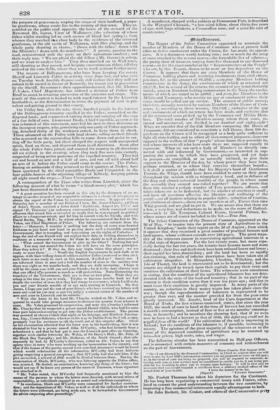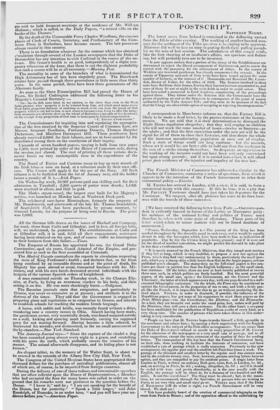if( idcriTancriu#.
The Report of the Select Committee appointed to ascertain the
number of Members of the House of Commons who at present bold office or derive emolument under the Crown, &e. has made its appear- once. It is a document worth looking into ; not so much for the array of sums attached to the several names—the formidable list of salaries— the pretty show of incomes, varying from five thousand to one thousand a-year—as for the exact number of the " Representatives of the People" who are, by this Report, shown to be more or less dependent on the Crown. It appears that there are sixty Members of the House of Commons holding places and receiving emoluments from civil offices, pensions, fee. to the amount of 86,201/. ; sixty-four Members bolding commissions in the Army, the emoluments of which as returned are 23,492/., but in several of the returns the amount of pay is not distinctly stated ; nineteen Members holding commissions in the Navy, the emolu- ments of which are stated to be 5,080/. ; encl./ewe-five Members in the Militia and Yeomanry, who receive no pay or emolument unless their corps should be called out on service. The amount of public money, therefore, annually received by various Members of the House of Com- mons, is, according to these returns, 114,863/. ; exclusive of the pay and emoluments of which no return has been made, and exclusive also of the occasional sums picked up by the Yeomanry and Militia 11.Iem- hers. The total number of Members among whom these sums, re- turned and unreturned, are divided is one hundred and eighty-eight ! When we consider that of the 656 Members composing the House of Commons, 350 are considered to constitute a full House, these 188 de- pendents on the Crown will be recognized as a body quite sufficient to fight all state-battles, and to effect all Government purposes--however opposed to the welfare of that " people" whose house they assemble in, and whose interests all who have seats there are supposed equally to represent. When we see such a body of Members so directly con- nected with and influenced by Government—so interested in sup- porting the system by which they have prospered, and yet hope to prosper—so compelled, or so naturally inclined, to give their support to the Minister of the day, by whose power they have been, perhaps returned, or to whom they conceive themselves bound— is it at all a matter of wonder that his Majesty's band of Gentlemen Patriots, the Whigs, should have been enabled to carry on their game throughout the session with so triumphant a hand, and in defiance of the deep and almost universal hostility of the people, in whose name the assembly they swayed was called together? We are aware that from this number a certain number of Tory pensioners, officers, and salary-takers are to be deducted ; but the number of seceders is small ; and upon all questions affecting the liberties and wellbeing of the people—on all matters relating to populagrights, reduction of taxation, and abolition of abuses—there are no seceders at all ; Tories then take Whig ground, and are glad to get it. We are aware also that there are a few, a very few real deductions to Inc made, on the score of Radical. ism—such as Mr. 'Tennyson, Colonel Evans, General Palmer, &c. whose names are of course included in the list.— True Sun.
The Select Committee of the House of Commons, appointed on the 3d of May, " to inquire into the present state of Agriculture in the United Kingdom," made their report on the 2d of August ; from which it appears that they examined a great number of practical farmers and land agents, whose evidence extends over 543 pages. The great majo- rity of the witnesses concur in representing agricultural interests in a fearful state of depression. For the last twenty years, but more espe- cially during the last.ten years, the tenants have become more and more distressed ; their live and dead stock have been reduced lower and lower ; their capital has been diminishing ; and the land has been so rapidly, deteriorating, that soils of inferior description have been taken out of cultivation altogether. In Shropshire, Cheshire, Wiltshire, and the Isle of Thanet, the land is represented not to be deteriorated; but the tenants are obliged to trench upon their capitals to pay their rents and continue the cultivation of their farms. The witnesses were unanimous in stating, that the condition of the agricultural labourers has not dete- riorated with the state of the land arid tenantry; that in no part of the country is their condition worse than it was ten years ago; and that in most cases their condition is greatly improved. In many parts of the country, no reduction in their money wages has taken place since the war ; though the superabundance of labourers is represented to be greater than ever, and the number provided for from the poor-rates greedy increased. Mr. Jacobs, head of the Corn department at the Board of Trade, the first witness examined, states, that since the year 1827, the stock of corn in hand at the time of harvest has not exceeded a month's consumption, instead of four or five or six months' consump- tion, as formerly; and he mentions the alarming het, that if we were now to have so bad a harvest as that of 1816, the deficiency could not be supplied from all tlw world! The cultivation of the soil is Improving in Ireland ; but the condition of the labourer is, if possible, increasing in misery. The opinions of the great majority of the witnesses as to the cause of the depressed condition of agriculture may be summed up into—low prices, high rents, rates, and wages.
'The following circular has been transmitted to Half-pay Officers, and is connected with certain measures of economy and retrenchment on the part of Government.
" Horse Guards, 21st August 1933. " Sir—I am directed by the General Commanding in Chief, to request that you will state to me, for Lord ITill's inthrmation.whether you are prepared to serve on all pay; as, in the event of your not being so prepared, you will be required to commute, re- ceiving such sum as your services may be considered to entitle you to, it not being pos- sible for 1rs Lordship to allow you to remain upon half.pay. It will in that case be necessary that you should transmit a certificate from a military medical officer of the actual state of your health. 1 have the honour to be, Sm. (Signed)" FITZROY SOMERSET." gned)
Mr. Poulett Thomson has taken his departure for the Continent. He has long been negotiating a commercial treaty with France, calcu- lated to cement the good understanding between the two countries, by improving a free commercial intercourse equally advantageous to both. Sir John Beckett, Mr. Croker, and others of theC on servative pray are said to hold frequent meetings at the residence of Mr. Will am Holmes ; which is called, in the Daily Papers, " a retired villa on the banks of the Thames."
By the death of the Honourable Percy Charles Wyndham, the sinecure places of Clerk of Courts, Secretary, and Prothonotary of the Com- mons Pleas in Barbadoes, have become vacant. The late possessor always resided in this country. There is no foundation whatever for the rumour which has obtained circulation through several of the London newspapers that the Duke of Devonshire has any intention to visit Carlsbad in the course of the au- tumn. His Grace's health is so good, independently of a slight tem- porary relaxation of the knee, that there is not the slightest probability that such a course will be at all necessary.—Morning Post.
The mortality in some of the branches of what is denominated the High Aristocracy has of late been singularly great. The Buccleuch estates have passed through three generations in little more than thirty years. In the same period, there have been three generations of the .Abercorn
As soon as the Slave Emancipation Bill had passed the House of Peers, Sir Bethel Codrington addressed the following letter to his Majesty's Colonial Secretary:— " Sir—As the Bill, more fatal, in my opinion, to the slave than even to the west India planter, who, !property is to be wrested from him, and which must make every West India proprietor desirous of realizing as much as he can from the wreck of that property which is yet left to him, is now about to become a law, I beg to offer the imme- diate manumission of every slave on the island of Barbadoes (upwards of live hundred), on the receipt of my proportion of that sum so inadequately termed compensation.
" C. BETIIEL CODIDNOTON."
The Commissioners for inquiring into and regulating the appropria- tion of the fees received by the Superior Courts of Common Law, are Messrs. Sergeant Goulburn, Fortunatus Dwarris, Thomas Bargiter Dickenson, and Matthew Davenport Hill. These gentlemen have already received 2,0001. for their labours, and are to have another 1,001. distributed among them on the conclusion of their inquiry.
Upwards of seven hundred papers, varying in bulk from two pages to 1,200, were printed by order of the House of Commons only, during the session just closed. The cost of printing all these various docu- ments forms no very contemptible item in the expenditure of the country.
The Board of Excise and Customs mean to buy up next month all the Irish tobacco now on hand, at a valuation made by their own offi- cers. The Crown will apply it for the use of the Navy. All Irish tobacco is to be forfeited from the 1st of January next, and the holder incurs a penalty of I( .1i.—Irish Paper.
On Wednesday week, 19,007 persons paid one shilling each for their admission to Vauxhall ; 3,200 quarts of porter were drunk ; 1,142/. were received in silver, and 1651. in gold.
The Medea steam-vessel, the largest ever built for his Majesty's service, was launched on Monday last, at Woolwich Dock-yard.
The celebrated race-horse Birmingham, formerly the property of Mr. Beardsworth, and afterwards of the late Mr. Thomas Searisbrick, of Scarisbriels Hall, has been purchased, by private contract, General Lounin, for the purpose of being sent to Russia. The price was 1,0001.



















 Previous page
Previous page